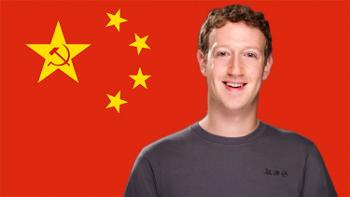The Chinese government likes to control social media and what people do with it—but Facebook looks willing to launch in China anyway.
For U.S. Internet businesses, China is the land of moral defeat. Many people hoped that Western technology companies would loosen China’s control over information. Instead, those companies have willingly participated in efforts to censor citizens’ speech. Yahoo gave Chinese authorities information about democracy activists, landing them in jail. Microsoft shut down the blog of prominent media-freedom activist Michael Anti. Google censored search results that were politically sensitive in China. In 2006, those three companies came before Congress and were accused by a subcommittee chairman of “sickening collaboration” with the Chinese government. Google shut down its mainland Chinese search engine in 2010, publicly complaining about censorship and cybersecurity.
Facebook has been blocked in China since 2009, and its Instagram photo-sharing service was blocked in 2014. I once thought that it would be disastrous or impossible for the social network to try a Chinese adventure of its own, and some China experts still believe that to be true. But a Facebook launch in China now looks probable.
Facebook’s founder and CEO, Mark Zuckerberg, has signaled to Beijing that he’s willing to do what it takes to get into the country. People who know the company well think it will happen. “It’s not an if, it’s a when,” says Tim Sparapani, who was Facebook’s first director of public policy and is now principal at SPQR Strategies, a consulting firm. Facebook declined to comment for this article, but Zuckerberg said last year: “You can’t have a mission to want to connect everyone in the world and leave out the biggest country.”
A decade after Google’s hopeful but ill-fated entry into China, U.S. Internet companies may see the Chinese market as even more tantalizing—yet impenetrable. The number of Chinese Internet users has surged to some 700 million, and they represent a valuable untapped resource for American companies with saturated, highly competitive home markets. But the Communist Party’s attempts to control information have also grown more intense. In addition to the “Great Firewall” that blocks access to foreign websites, legions of human censors, many employed at Internet companies, police domestic blogs and social networks. And a U.S. company would now have to compete with China’s own Internet giants. WeChat, a messaging app from the behemoth Tencent, has hundreds of millions of users.
Zuckerberg clearly thinks China is worth the trouble, even if that means leaving some “Western values” at the door. Earlier this year, he traveled to Beijing and had a high-profile meeting with China’s propaganda chief, Liu Yunshan. Chinese state media reported that Facebook’s founder praised China’s Internet progress and pledged to work with the government to create a better cyberspace. Liu highlighted the notion of Internet governance “with Chinese characteristics.” The translation was clear: a Chinese version of Facebook would definitely be censored. This year’s trip was something of a sequel. In 2014, he hosted Lu Wei, minister of the Cyberspace Administration of China, at Facebook’s offices. President Xi Jinping’s book The Governance of China just happened to be on Zuckerberg’s desk.
This courtship hasn’t been without some awkward moments. When Zuckerberg posted a photo of himself cheerfully jogging through the polluted haze of Tiananmen Square this year, he was mocked on Chinese social media. But overall he has made the right moves, says Cheng Li, director of the John L. Thornton China Center at the Brookings Institution. “Chinese leaders pay a lot of attention to personal relationships,” he says. “They think Mark Zuckerberg is a friend of China. He’s successful. He’s very China-friendly. He has a Chinese wife. He speaks Chinese. So what else do you want?”
At your service
Facebook will still have to overcome Beijing’s suspicions that American Internet companies could destabilize the Communist Party’s rule. Media outlets that described the Arab Spring as the “Facebook Revolution” didn’t do the company any favors. And documents leaked by the former intelligence contractor Edward Snowden fueled Chinese suspicions that American technology companies had “back doors” for U.S. government surveillance.
But Facebook’s potential to help Chinese businesses go global could lead Beijing to see the company as a net positive. It already sells advertisements to Chinese companies for display outside the country, but launching a version of Facebook in China could strengthen the connections between Chinese companies and overseas customers.
The fact that China now has mature social-media companies of its own might also make the government less wary of Facebook. The company would be unlikely to displace incumbents such as the ubiquitous WeChat, which has taken hold in China in a way that few outside the country truly appreciate. People use WeChat not only to communicate but to make purchases, hail taxis, and book doctor’s appointments. In America you can say “I’m not on Facebook” and still be a functioning member of society. Avoiding WeChat in China is much harder.
